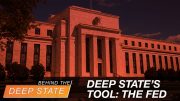GOP presidential contender Mitt Romney has announced that he would not reappoint Federal Reserve Chairman Ben Bernanke to a third term, but indicated he has not yet considered a replacement for him.
Romney’s choice of Federal Reserve chairman is a significant one, as the Fed has been the subject of consternation as a result of its Keynesian recession-fighting policies that have further damaged the economy rather than helping it.
“I always listen to people who have counsel and advice, but my view has been that I would want to select someone who is a new member, excuse me, a new person to that chairman position, someone who shared my economic views,” Romney said on the Fox Business Network.
“I haven’t considered a single person at this point, given no names any thought or deliberation,” he added.
Romney has mentioned a few names as potential replacements for Bernanke, including his top economic advisers Glenn Hubbard and Greg Mankiw, but has also stated he would consider others to fill the position.
But Romney’s economic adviser Hubbard disagrees with Romney, having stated earlier this week that he believes Bernanke should “get every consideration” to stay on another term. “Ben is a model technocrat. He gets paid nothing for getting kicked around all the time. I think they ought to pat him on the back,” he said.
But Hubbard’s contention that Bernanke should get “every consideration” to serve another term seems to underscore his lack of understanding on the negative impacts that Bernanke’s policies have had on the economy.
The Federal Reserve has attempted to stimulate the economy through quantitative easing — the purchase of assets from banks that increase liquidity in the economy — but that simply provides an illusion of economic growth. Any faith placed in stimulus is false, according to economist Peter Schiff. “I think the only thing that is punctuating the recessions is the phony growth that we get from the stimulus. But it’s not real growth. All we do is spend more borrowed money,” he explained.
But that has not stopped Bernanke from telling Congress that the Fed is once again considering quantitative easing, as he is convinced that the effort would drive down interest rates and improve the rate of economic growth. Bernanke points to the economy’s failure to progress after it witnessed a drop in unemployment between September and April. He has said that the Fed would continue to take action if the economy does not grow quickly enough to reduce unemployment. “We are very committed to ensuring, or at least doing all we can to ensure, that we continue to make progress on unemployment,” he assured Congress earlier this month.
Hubbard’s support of Bernanke seems to reveal that he advocates a Keynesian approach to the economy as opposed to the Austrian free market philosophy of economics.
And Romney has called Hubbard a wonderful economic adviser, even as they disagree on something as significant as who should chair the Federal Reserve. Romney contends that he would like to see the Federal Reserve adopt policies that are more likely to create an environment for economic growth. He stated, “I want to make sure the Federal Reserve focuses on maintaining the monetary stability that leads to a strong dollar and confidence that America is not going to go down the road that other nations have gone down, to their peril.”
Romney’s running mate, Paul Ryan, has been a critic of the Federal Reserve’s policies and the fact that those policies are not available for congressional scrutiny.
There has been no stauncher critic of the Federal Reserve and no more leading voice for increased congressional scrutiny of its policies than Texas Republican Congressman Ron Paul, who has called the Fed a “dishonest, immoral, unconstitutional” institution. He has noted some of the Federal Reserve’s most disastrous interventionist moves and their impact on the economy:
Although Congress and the Treasury helped bring about the housing bubble and financial collapse with legislation, regulations, and keeping the funds flowing to reckless institutions such as Fannie Mae and Freddie Mac, the Fed was the main cause of the crisis. Its interference in setting interest rates distorted the market, and its status as the “lender of last resort” ensured banks could hook individuals and businesses for loans on projects that weren’t in as high demand as forecasters believed.
When the crash occurred, common sense dictated a change in policy. But the Federal Reserve only increased its lending and intervention to historic highs.
While selling Americans a bill of goods that the economy would never recover without unprecedented bailouts, we now know that at the peak of its “emergency lending,” the Fed was providing nearly 90% of its discount window loans to foreign banks! This included making over 70 loans to a bank partially owned by the Bank of Libya.
Likewise, the creation of the Federal Reserve in 1913 has resulted in massive inflation. The Minneapolis Federal Reserve branch’s own website admits that what could have been purchased for $1.00 in 1913 would now cost $22.55.
Just where Romney stands on the Federal Reserve is difficult to determine. He has publicly stated that he supports Ron Paul’s Audit the Fed bill, but has also indicated that he believes the Fed should remain independent from Congress.
“The Federal Reserve should be accountable,” Romney declared at a New Hampshire campaign stop. “We should see what they’re doing.”
A later question prompted him to say that he supports an audit of the Fed, but he added, “I want to keep [the Fed] independent. There are very few groups that I would not want to give the keys to. One of them is Congress.”
Meanwhile, there has been no indication from Bernanke on whether he would even want a third four-year term, though his acquaintances have said he would not.





